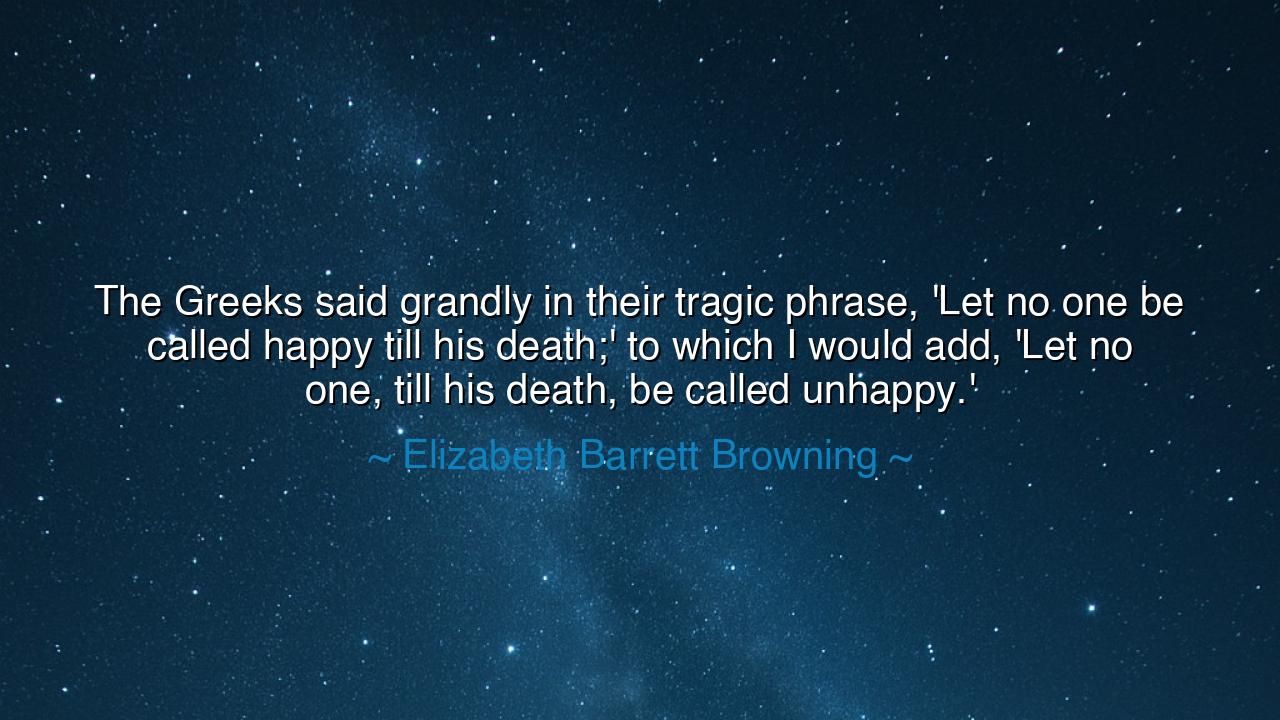
The Greeks said grandly in their tragic phrase, 'Let no one be
The Greeks said grandly in their tragic phrase, 'Let no one be called happy till his death;' to which I would add, 'Let no one, till his death, be called unhappy.'






In the luminous and contemplative words of Elizabeth Barrett Browning, one of the great poets of the soul, there resounds both wisdom and mercy: “The Greeks said grandly in their tragic phrase, ‘Let no one be called happy till his death;’ to which I would add, ‘Let no one, till his death, be called unhappy.’” This is not merely an echo of ancient philosophy—it is its transformation. Browning takes the stoic grandeur of Greek tragedy, which saw life as a fragile play in which fortune could reverse at any moment, and turns it toward compassion and hope. Where the ancients warned against calling a man “happy” before the end, lest fate humble him, Browning replies with the gentleness of the heart: as long as life remains, hope remains. No one, while breathing, should be called unhappy, for the story is not yet finished.
The origin of Browning’s thought lies in the words of Solon, the wise lawgiver of ancient Athens. When asked by King Croesus of Lydia whether he was the happiest of men, Solon replied, “Call no man happy until he is dead.” For the Greeks, this meant that life’s fortunes were ever-changing; even the prosperous could fall into ruin before death closed their tale. It was a caution against pride, against assuming one’s blessings would endure. Yet Elizabeth Barrett Browning, writing centuries later in the gentler light of faith and humanism, reshaped that stern teaching into one of consolation. Where the Greeks saw the finality of destiny, Browning saw the fluidity of grace. Her addition—“Let no one, till his death, be called unhappy”—is a hymn to the power of redemption, the truth that life can renew itself even from ashes.
Her insight arose not from abstraction, but from experience. Elizabeth Barrett Browning herself lived a life marked by pain and struggle. Frail in body, long confined by illness, she knew despair’s shadow well. Yet in her suffering, she discovered the unyielding resilience of the spirit. Her love for Robert Browning, her courage to defy her family’s will, and her flight to Italy to begin anew—all these proved her belief that even the darkest seasons can bloom again. For her, unhappiness was never permanent; it was a passing storm that could clear, if one only endured. In her words we hear not mere philosophy, but testimony—the voice of a woman who refused to let sorrow define her life before its final page.
The ancient world gave us the tragedies of Oedipus and Agamemnon, men undone by fate and error, whose deaths sealed the meaning of their lives. But Browning’s vision belongs to a different age—an age that sees not the gods’ cruelty, but the divine mercy that can visit even the fallen. She reminds us that as long as the heart beats, transformation is possible. The poor may rise, the wounded may heal, the estranged may reconcile, and the despairing may yet find joy. In this, she redefines tragedy itself—not as the fall from greatness, but as the refusal to believe that renewal can come. Thus, while the Greeks warned that happiness could not be secured until death, Browning insists that unhappiness cannot be sealed until life is done.
History, too, offers witness to this truth. Think of Nelson Mandela, who spent twenty-seven years imprisoned, cut off from the world, thought by many to have been crushed by injustice. Yet when he emerged, he carried not bitterness, but peace, and became the healer of his nation. For nearly three decades, by Greek measure, his life might have been called unhappy—but Browning’s wisdom would have held otherwise. For in the end, his suffering became his strength, and his story closed not in defeat, but in triumph. Such is the power of endurance, of living long enough to see sorrow redeemed.
To call someone unhappy before their time, Browning teaches, is to deny them the sacred unfolding of life’s mystery. Who can know what morning will rise after a night of despair? Who can see what blessings are yet hidden within hardship? The soul that endures may yet find beauty in places it never thought to look. Even in her frailty, Browning saw this—the endless possibility that tomorrow might bring healing, that love might conquer grief, that faith might illumine darkness. Her words are a reminder that the measure of life is not what it has been, but what it might still become.
So, my children of the living world, take this wisdom as your shield against despair: judge no life too soon, not even your own. When misfortune befalls you, do not declare yourself unhappy—for the final chapter has not been written. The wheel of fate turns, and joy can return as swiftly as it fled. Be humble when blessed, and patient when burdened. As the ancients taught, do not boast before the end; but as Browning teaches, do not despair before it either. For as long as breath remains, the heart may yet be healed, and even the longest sorrow may still give way to light.
Thus, in her simple yet radiant addition to the wisdom of the Greeks, Elizabeth Barrett Browning offers the perfect balance of courage and hope: “Let no one be called happy till his death—but let no one, till his death, be called unhappy.” It is both warning and promise, both the humility of fate and the defiance of faith. Remember this, and live as she lived—not in fear of endings, but in trust of what is yet to come.






AAdministratorAdministrator
Welcome, honored guests. Please leave a comment, we will respond soon